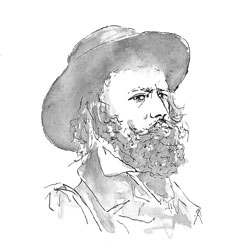Reading ‘Tears, idle tears’ (5): Herbert F. Tucker and Tennyson’s experimental form
Tears, idle tears, I know not what they mean,
Tears from the depth of some divine despair
Rise in the heart, and gather to the eyes,
In looking on the happy Autumn-fields,
And thinking of the days that are no more.Fresh as the first beam glittering on a sail,
That brings our friends up from the underworld,
Sad as the last which reddens over one
That sinks with all we love below the verge;
So sad, so fresh, the days that are no more.Ah, sad and strange as in dark summer dawns
The earliest pipe of half-awaken'd birds
To dying ears, when unto dying eyes
The casement slowly grows a glimmering square;
So sad, so strange, the days that are no more.Dear as remember'd kisses after death,
And sweet as those by hopeless fancy feign'd
On lips that are for others; deep as love,
Deep as first love, and wild with all regret;
O Death in Life, the days that are no more.
According to Herbert F. Tucker in Tennyson and the Doom of Romanticism, 'Tears, idle tears' is 'probably the greatest of the Princess songs and certainly the one that has received the most illuminating critical analysis'. 'From the best readings', claims Tucker, 'a consensus emerges that "Tears, idle tears" provides a symbolic meditation on the paradoxical presence of absence within the memory'. What do you think Tucker means when he suggests that Tennyson's poem is about 'the paradoxical presence of absence within the memory'? Do you think F.R. Leavis, Cleanth Brooks and Heather Glen would agree with him, and do you agree with his summary of 'Tears, idle tears'?
Tucker describes how Tennyson himself eventually said 'Tears, idle tears' was about 'the passion of the past' and 'the yearning that young people occasionally experience for that which seems to have passed away from them for ever'. How useful do you think these authorial statements are as keys to understanding the poem? 'Tennyson's comments' - according to Tucker - 'point to an indwelling mood, a state of mind occasionally experienced by anyone but belonging to no one, independent of personal control'. Inspired by the insights of another literary critic, Timothy Peltason, Tucker then suggests that 'the subject of this poem is not "thinking of the days that are no more" but rather thinking about thinking about those days'.
Perhaps the reason why 'Tears, idle tears' appears to be so impersonal is that it is a poem that thinks about thoughts and not about people: do you find this a useful way to think about the poem? Given how much emphasis Cleanth Brooks placed on the character of 'Tennyson's Weeper', it is not surprising that Tucker dismisses his discussion of 'Tears, idle tears' as one which 'epitomizes the shortcomings of persona poetics': insofar as this poem concerns 'thinking about thinking', claims Tucker, 'the speaking subject... scarcely exists at all'. Tucker suggests that Tennyson's poem concerns the idea of the subject - the idea of someone thinking and speaking - as opposed to any particular individual. Here he observes the same movement away from particularity that was noticed by both F.R. Leavis and Professor Glen, but then pushes this idea to the extreme. Do you think Tucker is too extreme here?
As much as Tucker disagrees with Brooks, he - like Professor Glen - uses many techniques which New Critics like Brooks would have endorsed in order to illustrate and justify his assertions. 'The disappearance of the individual subject' is, for Tucker, enacted in the poet's choice of language. For example: beyond stanza 2's initial replacement of the first-person singular with 'the communal "we" and "our"', Tucker believes that 'a subtler index' of the poet's 'self-effacing design lies in Tennyson's syntax: the speaker knows not "what they mean", but idle tears "Rise in the heart, and gather to the eyes"'. He also notes the impersonal way that 'the' is preferred to 'my' in this line.
If you do agree with Tucker's central claim that 'Tears, idle tears' is about 'thinking about thinking', perhaps you will also agree with Tucker that an analysis of this lyric's function within its 'frame text' supports that claim. Indeed, considering 'the immediate context of The Princess', Tucker argues:
We may note that 'Tears, idle tears' elicits from Ida only a defensive scorn. This lyric devised by a male narrator and placed in the mouth of an unnamed minstrel 'maid' stakes out a no man's land that is no woman's either, as Ida understands in rejecting its , 'haunting' message as 'So sweet a voice and vague, fatal to men'.
Does Tucker convince you when he uses this claim that 'Tears, idle tears' is effectively sexless to support his assertion that the whole poem dramatises 'the disappearance of the individual subject'?
Now's your chance to have your own say in the ongoing debate about Tennyson's 'Tears, idle tears'. What do they mean? Go on to the next page and cast your votes!
Click here to continue to the next part of this close reading of Tennyson's 'Tears, idle tears'.
